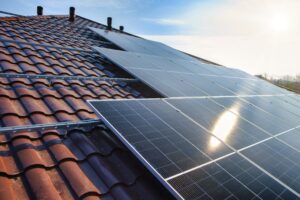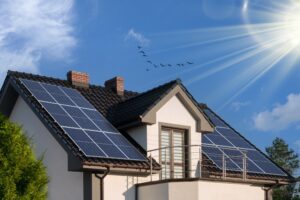Tax Incentives for Solar
More and more homeowners and businesses are enjoying the environmental and financial benefits of solar energy. Over 183,000 solar panel systems were installed in the UK in 2023 – a 30% increase on the previous year.
Solar panels generate free, renewable, low-carbon energy that cuts fuel bills by reducing use of mains electricity. The only real downside of going solar is the initial cost – several thousand pounds for households and often tens of thousands for large businesses.
However, government-backed incentives, including tax reductions and allowances, make installing solar panels a much more affordable option. Homeowners benefit from VAT cuts and grants when installing solar panels while businesses get tax breaks. Both can earn money for surplus solar energy they produce.
You can find out here how these initiatives work and how much you could save.
Solar Panel Size, Cost and Savings
The size of your solar panel system determines installation costs and the extent to which you can reduce energy bills. Solar panels on average cut electricity bills by around 70%.
Solar panel system sizes are measured in kilowatts (kW).
- A 3kW solar panel installation costs around £7,000 to £8,000. It can cut energy bills by around £440 a year.
- 4kW and 5kW systems, costing £9,000 to £12,000, yield annual savings of around £660.
- A 6kW system, costing around £13,000, typically saves approximately £1,000 a year.
VAT Incentives on Solar Panels
VAT – value-added tax – on the purchase price of goods and services is one of the main ways the government raises revenue.It was introduced in 1973 in anticipation of the UK joining the European Economic Community (EEC).
The standard VAT rate was initially 10% but is now double that at 20%. However, this rate doesn’t apply to energy-saving materials (ESMs), such as solar panels, installed in domestic properties.
To encourage renewable energy systems and improve energy efficiency of homes, the government cut VAT on solar panels to 0% to encourage more homeowners to install them.
Zero VAT on Solar Panels Until 2027
VAT on solar panels for homes was originally 5% but became zero-rated in April 2022. This tax incentive is set to last until April 2027, when the rate is expected to go back to 5%..
The 0% rate initially applied to all households in England, Wales and Scotland. It was extended in May 2023 to cover Northern Ireland.
Currently, you won’t pay any VAT on solar panels if they’re supplied and installed by the same company. If you get solar panels from one provider and have them installed by someone else, you’ll be charged 5% VAT on the cost of installation.
The 5%t rate also applies to solar panel maintenance or repair services after the system is installed.
- Create a Tailored Quote Based On Your Circumstances
- Takes Less Than 2 Minutes
- Fixed-Online Quotes

Average Savings on Solar Installation with Zero VAT
The zero rate of VAT on solar panels reduces costs by several hundred pounds.
Take the average-sized solar panel system of four to five kilowatts. This would be needed to power a home for a medium-sized household of up to four people. Let’s say it’s priced at £10,000 by the installers.
If you had to pay the full rate of VAT, this would push the price up to £12,000. With the 5% rate, the cost was £10,500. With 0% VAT, the price goes back down to £10,000.
VAT and Solar Batteries
Solar batteries optimise energy use by giving you more solar power when you need it most.
Solar panels supply energy during the hours of daylight, when homes generally need less electricity. If you don’t use this solar energy immediately, it goes back to the grid for someone else to use.
A solar battery stores the energy so you can use it anytime, night or day. This results in significant long-term savings by reducing dependence on the grid.
Originally, 0% VAT on solar storage batteries applied only if they were installed at the same time as your solar panels. You still had to pay 20% VAT on batteries added to an existing solar panel system.
In February 2024, the government extended VAT relief on solar batteries. They’re currently zero-rated for VAT regardless of when they’re installed.
VAT on Energy Use
VAT on electricity and gas used by households is 5%. Businesses pay the full rate of 20%. The government so far has no plans to further reduce VAT on energy bills.
Solar Tax Incentives for Businesses
It costs small and medium-sized businesses an average of £50,000 to £100,000 to install solar panels to power their operations.
Businesses don’t qualify for VAT relief. They have to pay the standard rate of 20% on installation costs.
However, there are other ways businesses save money on going solar. These include capital investment allowances and solar tax credits, which reduce taxable income.
Annual Investment Allowance
The Annual Investment Allowance (AIA) is a type of capital investment allowance that enables businesses to claim tax relief on essential assets, including solar panels. The AIA allows businesses to deduct up to 100% of the cost of a solar panel installation before taxes on its profits are calculated.
Solar Tax Credits
Solar tax credits in the form of Investment Tax Credit (ITC) allow businesses to deduct a percentage of solar installation costs from taxable income. This reduction in tax owed significantly lowers the cost of going solar.
Smart Export Guarantee
Homeowners and businesses can get paid for any excess energy they generate with a renewable energy source such as solar panels.
This happens through the Smart Export Guarantee (SEG). SEG was launched in 2020 to replace the more complicated Feed-in Tariff (FiT). FiT payments are still made by the scheme but it closed to new applicants in 2019.
The Smart Export Guarantee is run by Ofgem (Office of Gas and Electricity Markets), and SEG-licensed electricity suppliers set their own tariffs. The amount paid for each unit of electricity varies among energy suppliers.
To get a SEG tariff, you apply directly to a SEG supplier. To qualify for payments, your solar panel system must be certified under the Microgeneration Certification Scheme (MCS) – the industry standards organisation.
Payments start as soon as your smart meter or export meter begins sending readings to the electricity supplier.
You may be able to earn money by exporting energy in solar batteries back to the grid, but payments for this “brown electricity” aren’t automatic.
Are SEG Payments Taxed?
Households who sell surplus solar energy back to the grid aren’t taxed on this income. However, businesses do have to pay tax on SEG income, which is considered as trading revenue. SEG payments can be offset against profits in order to reduce corporation tax liability.
The Energy Company Obligation Scheme
Low-income households claiming a means-tested benefit can apply for grants to install solar panels in some circumstances.
The main financial incentive comes from the Energy Company Obligation, which has been running since 2013. It requires energy suppliers to improve energy efficiency in households struggling with fuel bills.
The scheme is aimed at relieving fuel poverty and reducing carbon emissions in homes with a low Energy Performance Certificate (EPC) rating.
It’s now in its fourth phase – the £4 billion ECO4. Launched in 2022, this is scheduled to run until the end of March 2026. But it could end sooner if energy companies meet their obligation.
ECO4 can pay up to the entire cost of solar panels to power an electric heating system, provided that a heat pump or biomass boiler has been ruled out.
- Create a Tailored Quote Based On Your Circumstances
- Takes Less Than 2 Minutes
- Fixed-Online Quotes

LA Flex
La Flex – Local Authority Flexible Eligibility – extends the scope of the Energy Company Obligation Scheme by expanding eligibility conditions beyond income.
LA Flex – also known as ECO4 Flex – is open to households not getting a means-tested benefit, if they live in a cold home or in fuel poverty.
Unlike ECO4 itself, local councils set their own funding eligibility criteria for LA Flex. This increases the number of households that can benefit from solar grant incentives.
Home Upgrade Grant
The Home Upgrade Grant (HUG) offers up to £10,000 in solar panel funding. The £700 million scheme is open to homeowners in certain postcode areas of England off the gas grid. Their annual combined income has to be £31,000 a year or less.
The government provides local authorities with HUG funding, which will continue until March 2025.
How to Get Full Benefit from Tax Incentives for Solar
Tax incentives and other financial support to install solar panels help more homeowners and businesses save money on energy bills and reduce their carbon footprint.
You can maximise the benefits of going solar by ensuring your solar panels are installed by a trusted company. Effective Home has been installing solar panel systems in homes and business premises across the UK for more than 15 years.
Phone us on 0333 003 0703 or contact us online for a free site survey and quote.
- Create a Tailored Quote Based On Your Circumstances
- Takes Less Than 2 Minutes
- Fixed-Online Quotes




